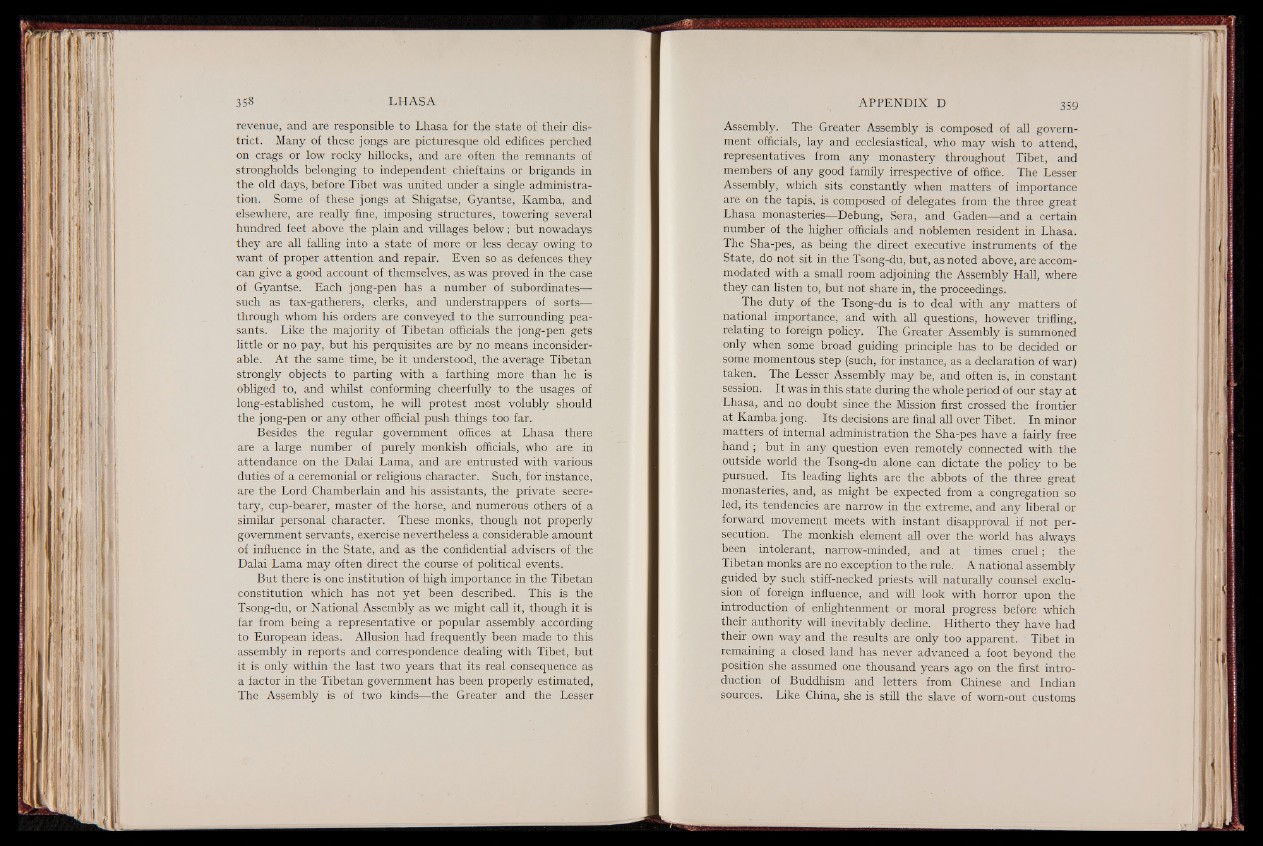
revenue, and are responsible to Lhasa for the state of their district.
Many of these jongs are picturesque old edifices perched
on crags or low rocky hillocks, and are often the remnants of
strongholds belonging to independent chieftains or brigands in
the old days, before Tibet was united under a single administration.
Some of these jongs at Shigatse, Gyantse, Kamba, and
elsewhere, are really fine, imposing structures, towering several
hundred feet above the plain and villages below ; but nowadays
they are all falling into a state of more or\less decay owing to
want of proper attention and repair. Even so as defences they
can give a good account of themselves, as was proved in the case
of Gyantse. Each jong-pen has a number of subordinates—
such as tax-gatherers, clerks, and understrappers of sorts—
through whom his orders are conveyed to the surrounding peasants.
Like the majority of Tibetan officials the jong-pen gets
little or no pay, but his perquisites are by no means inconsiderable.
At the same time, be it understood, the average Tibetan
strongly objects to parting with a farthing more than he is
obliged to, and whilst conforming cheerfully to the usages of
long-established custom, he will protest most volubly should
the jong-pen or any other official push things too far.
Besides the regular government offices at Lhasa there
are a large number of purely monkish officials, who are in
attendance on the Dalai Lama, and are entrusted with various
duties of a ceremonial or religious character. Such, for instance,
are the Lord Chamberlain and his assistants, the private secretary,
cup-bearer, master of the horse, and numerous others of a
similar personal character. These monks, though not properly
government servants, exercise nevertheless a considerable amount
of influence in the State, and as the confidential advisers of the
Dalai Lama may often direct the course of political events,.
But there is one institution of high importance in the Tibetan
constitution which has not yet been described. This is the
Tsong-du, or National Assembly as we might call it, though it is
far from being a representative or popular assembly according
to European ideas. Allusion had frequently been made to this
assembly in reports and correspondence dealing with Tibet, but
it is only within the last two years that its real consequence as
a factor in the Tibetan government has been properly estimated,
The Assembly is of two kinds— the Greater and the Lesser
Assembly. The Greater Assembly is composed of all government
officials, lay and ecclesiastical, who may wish to attend,
representatives from any monastery throughout Tibet, and
members of any good family irrespective of office. The Lesser
Assembly, which sits constantly when matters of importance
are on the tapis, is composed of delegates from the three great
Lhasa monasteries— Debung, Sera, and Gaden— and a certain
number of the higher officials and noblemen resident in Lhasa.
The Sha-pes, as being the direct executive instruments of the
State, do not sit in the Tsong-du, but, as noted above, are accommodated
with a small room adjoining the Assembly Hall, where
they can listen to, but not share in, the proceedings.
The duty of the Tsong-du is to deal with any matters of
national importance, and with all questions, however trifling,
relating to foreign policy. The Greater Assembly is summoned
only when some broad guiding principle has to be decided or
some momentous step (such, for instance, as a declaration of war)
taken. The Lesser Assembly may be, and often is, in constant
session. It was in this state during the whole period of our stay at
Lhasa, and no doubt since the Mission first crossed the frontier
at Kamba jong. Its decisions are final all over Tibet. In minor
matters of internal administration the Sha-pes have a fairly free
hand ; but in any question even remotely connected with the
outside world the Tsong-du alone can dictate the policy to be
pursued. Its leading lights are the abbots of the three great
monasteries, and, as might be expected from a congregation so
led, its tendencies are narrow in the extreme, and any liberal or
forward movement meets with instant disapproval if not persecution.
The monkish element all over the world has always
been intolerant, narrow-minded, and at times cruel; the
Tibetan monks are no exception to the rule: A national assembly
guided by such stiff-necked priests will naturally counsel exclusion
of foreign influence, and will look with horror upon the
introduction of enlightenment or moral progress before which
their authority will inevitably decline. Hitherto they have had
their own way and the results are only too apparent. Tibet in
remaining a closed land has never advanced a foot beyond the
position she assumed one thousand years ago on the first introduction
of Buddhism and letters from Chinese and Indian
sources. Like China, she is still the slave of worn-out customs